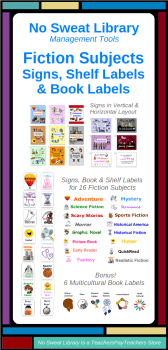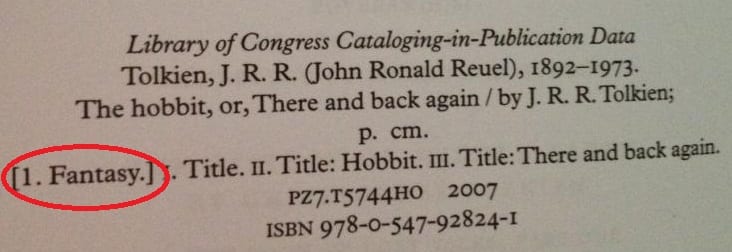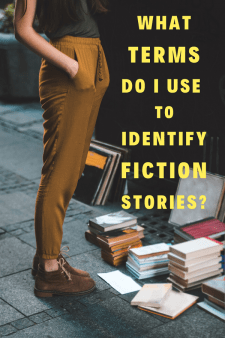 “Is there a common standard or system to organize Fiction books in the school library?”
“Is there a common standard or system to organize Fiction books in the school library?”
Many a School Librarian asks this question when reorganizing books in the school library’s Fiction area. And, as it turns out, librarians do have a standardized terminology for books—it’s called Subject Headings!
During my cataloging class, I learned that every book’s MARC record has at least one Subject term and many have multiple Subjects. These MARC record Subjects come from an approved professional source: either the Library of Congress Subject Headings or SEARS Subject Headings. There are four different types of Subject Headings—topical, form, geographic, and proper names—and for reorganizing Fiction books, we want topical Subject Headings.
You can usually find the LCSH or SSH Subjects for a book by looking on the copyright page for the LOC Cataloging-In-Publication data (CIP). In the ‘Subject’ lines you’ll see well-known terms for fiction stories: adventure, mystery, fantasy, science fiction, historical fiction, romance, and horror.
COMMON FICTION SUBJECT TERMINOLOGY
Some librarians have suggested using BISAC terms for their fiction area, which is what bookstores use for grouping books. It seems very complicated for practical use with students, and would require a lot more work for us than just using the Subject Headings that are already in our automation system. Other school librarians offer alternatives, but none of them seem to be workable with students nor for us. Our time is so limited that we don’t need to complicate it when such a usable system is already in place.
Some fiction books no longer show CIP data on the copyright page, so it may take more effort to identify Subjects for all the books. However, it’s easy to search the library catalog By Subject for fiction books with that Subject in their MARC records. Also, any library automation system can generate a report of fiction books for a particular Subject, which can be sorted alphabetically so a school librarian can easily work their way down the Fiction aisles applying Subject labels when they are reshelving books.
To organize the school library’s fiction books by Subject, here’s a list of some common LOC Subjects for fiction literature that I used when doing my Fiction reorganization:
- Adventure stories OR Adventure and adventurers OR Survival fiction OR Plot-your-own-stories
- Classical fiction OR Classical literature OR Classics, literary
- Families fiction OR Domestic fiction
- Fantasy fiction OR Heroic fantasy
- Graphic novels OR Fiction graphic novels OR Graphic fiction
- Historical fiction
- Horror fiction OR Horror stories OR Scary stories OR Ghost stories OR Occult fiction OR Occult stories OR Paranormal fiction OR Supernatural fiction
- Humor OR Humorous stories
- Mystery and detective stories OR Detective and mystery stories OR Suspense fiction OR Thrillers OR Spy stories OR Code and cipher stories
- Outdoor life fiction OR Nature stories
- Paranormal Romance
- Romance fiction OR Love stories OR Dating (Social customs) fiction OR Coming of age stories OR Social life and customs fiction
- Schools fiction OR High schools fiction OR Middle schools juvenile fiction
- Science fiction OR Future life fiction OR Alternative histories fiction OR Cyberpunk fiction OR Steampunk fiction OR Life on other planets fiction
- Sports stories
- Stories-in-rhyme
- Urban fiction OR Street life fiction OR City or town life fiction OR Suburban life fiction
- War fiction OR War stories
- Western fiction OR Western stories
- Young adult fiction
Library vendors, like Demco or The Library Store, sell Subject Classification labels for fiction books, and they use these same standard Subject Headings. Even if a librarian does not separate the fiction collection into Subject groups, many still buy and use these vendor’s Subject labels to help students choose a book that appeals to them.
USE THE WORDS “FICTION SUBJECTS” WITH STUDENTS
I do NOT use the word genre for my Fiction groupings, because I don’t want to confuse students:
- Our online book catalogs can search By Subject, using the Subject field of the MARC record. When we school librarians use the words “Fiction Subjects” to identify our Fiction groupings, it clearly relays to students the terms to use when searching for a particular kind of fiction story.
linebreak - We use the word Subject for students’ courses, and we often use the word Subject for Dewey, as in Science, History, Literature, Languages. By using Subject for fiction stories, students grasp “Subjects” as a mechanism for representing specific groupings, whether in school, or in Dewey, or in Fiction. Students need this consistency in the library. We can make it even clearer by associating the Dewey Subject of Science with the Fiction Subject of Science Fiction, and the Dewey Subject of History with the Fiction Subject of Historical Fiction.
linebreak - In their English Language Arts classes (as in library cataloging) the word genre refers to types (or forms) of literature—narrative, expository, poetry, drama—not a kind of fiction story.
Because I carefully avoid using the term genre for books in the Fiction area,
ELA teachers appreciate that I don’t confuse what they are teaching students!I tried, as some folks do, using the word subgenres, but that was even more confusing for kids. Students already get so much new vocabulary that we can make it easier for them to differentiate types of literature from kinds of stories by consistently using the words Fiction Subjects!
KEEP THE LIBRARY KID-FRIENDLY
 I believe it’s our job as School Librarians to make our libraries as “kid-friendly” as possible. Since I reorganized my Fiction area and began to say “Fiction Subjects“, it’s become so much easier for my middle school students to search for and locate the kinds of Fiction stories they want to read.
I believe it’s our job as School Librarians to make our libraries as “kid-friendly” as possible. Since I reorganized my Fiction area and began to say “Fiction Subjects“, it’s become so much easier for my middle school students to search for and locate the kinds of Fiction stories they want to read.
My method of using accepted professional Subject terminology to reorganize our Fiction area, using topical Subject labels and color-coding on book spines to clearly identify the Subjects, and consistently using the words Fiction Subjects has made our School Library’s Fiction area so much easier to navigate and eliminates the need for students to ask where certain books are. I think this method will make your school library more kid-friendly, too!
![]()




